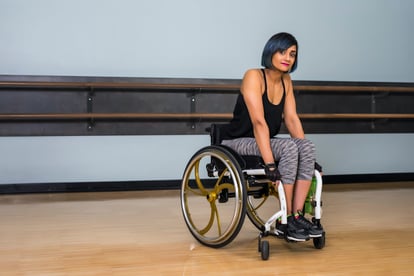Recreation May Be Key to Disability Empowerment and Mental Wellness
Join Our Movement
What started as an idea has become a national movement. With your support, we can influence policy and inspire lasting change.
Become an Advocate
When I moved away from my small town-bubble to attend college, my world was significantly changed. I experienced enormous challenges living on my own during college, from needing to employ caregivers to assist me with activities of daily living, navigating barriers around my campus, facing difficulties with classroom accommodations, and overall trying to fit in at a large university with people who didn’t always understand disability. Again, I was fortunate to access resources and connect with people who helped me find outlets for recreation and social connections. Most helpful to me was connecting with students at my university who were studying therapeutic recreation. I expressed my interest in trying new things, and for the first time in my life, I learned about all kinds of organized adaptive sports that I had never heard about before. Even more than that, my motivation for adapting all sorts of traditional activities skyrocketed. With the physical help of many supportive people, I tried everything from adaptive downhill skiing, power wheelchair soccer, kayaking, horseback riding, roller coasters, parasailing, and more.
Being able to try new things boosted my confidence and inspired me to study abroad during college. Never in my wildest dreams did I ever think it would be possible to travel by plane, but with growing confidence, I pursued it and successfully traveled with the assistance of people helping me. Through all of these experiences, I learned how much was possible for my life despite being so severely limited by my muscles. At one point, I even tried riding on a snowmobile by having my friends rig up an adaptive way to strap my body to the seat. The greatest life lessons that I took away from all of these experiences throughout my life are you always have to try new things, push yourself beyond your comfort zone, don’t be afraid to ask for help, and believe in your ability to succeed.
My personal experiences with adaptive recreation combined with my professional training as a mental health therapist have given me a unique perspective. Many people advocate for disability inclusion, and many people who advocate for mental health awareness, but few people are specialized in the intersection of these areas. As a result, the mental health needs of those with disabilities are sometimes overlooked. It’s often very hard for individuals with disabilities to feel included in society because historically, the world was not designed for disability. Especially for individuals living with paralysis, there is a constant need to adapt to your environment.
Sometimes non-disabled people are unconsciously uncomfortable around people with disabilities like paralysis. It’s often very exhausting for individuals and families with a disability is to always have to explain their needs to people who don’t quite understand them, to adapt themselves to the world at large, and to feel an overwhelming sense of difference from the mainstream community. In addition, disability stigmas and stereotypes are so powerful that it can be hard to build meaningful connections through social outlets. This often leads to feelings of isolation, loneliness, low self-confidence, anxiety, and depression.
Recreation can be the key to alleviating these challenges. If you or someone you know is experiencing mental exhaustion due to your paralysis-related challenges, loneliness due to feelings of isolation, or depression due to a lack of enjoyment in day-to-day life, I urge you to consider greater opportunities for recreation. It doesn’t matter the type of recreation. Every individual will have unique needs and interests. It might be as simple as playing a board game or doing a crossword puzzle. Others may be interested in organized adaptive sports or finding accessible trails to hike on. Or maybe you want opportunities to engage in arts and crafts. Every single type of recreation – no matter what it is – can be extremely beneficial for your mental health. Especially for those living with paralysis, recreation may just be the key to empowerment.
I consider it my passion and purpose in life to bridge the conversation between disability empowerment and mental wellness so that more and more people with disabilities can establish meaningful connections with others and be included as equal, accepted citizens of the world. How can we create meaningful connections between those with and without disabilities in a way that benefits everyone? Recreation is an excellent starting point, especially when your involvement in recreation allows opportunities to be a part of a wider social atmosphere, to build confidence and coping skills, and to elicit feelings of personal joy and fulfillment that lead to stronger relationships.
